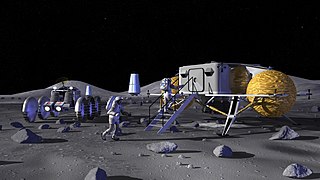Related Research Articles

The Jet Propulsion Laboratory (JPL) is a federally funded research and development center and NASA field center in the city of La Cañada Flintridge with a Pasadena mailing address, within the state of California, United States.

The Discovery Program is a series of Solar System exploration missions funded by the US National Aeronautics and Space Administration (NASA) through its Planetary Missions Program Office. Each mission has a cost cap, at a lower level than a mission from NASA's New Frontiers or Flagship Programs. As a result, Discovery missions tend to be more focused on a specific scientific goal.
The Lunar and Planetary Institute (LPI) is a scientific research institute dedicated to study of the solar system, its formation, evolution, and current state. The Institute is part of the Universities Space Research Association (USRA) and is supported by the Science Mission Directorate of the National Aeronautics and Space Administration (NASA). Located at 3600 Bay Area Boulevard in Houston, Texas, the LPI maintains an extensive collection of lunar and planetary data, carries out education and public outreach programs, and offers meeting coordination and publishing services. The LPI sponsors and organizes several workshops and conferences throughout the year, including the Lunar and Planetary Science Conference (LPSC) held in March in the Houston area.

Pascal Lee is co-founder and chairman of the Mars Institute, a planetary scientist at the SETI Institute, and the Principal Investigator of the Haughton-Mars Project (HMP) at NASA Ames Research Center in Mountain View, California. He holds an ME in geology and geophysics from the University of Paris, and a PhD in astronomy and space sciences from Cornell University.
Doris Daou is a Lebanese-born astronomer from Canada who was formerly the Director for Education and Public Outreach of the NASA Lunar Science Institute and the Associate Director of the NASA Solar System Exploration Research Virtual Institute (SSERVI), and is currently the program contact for NASA's "Small Innovative Missions for Planetary Exploration (SIMPLEx)".

Sol Alan Stern is an American engineer and planetary scientist. He is the principal investigator of the New Horizons mission to Pluto and the Chief Scientist at Moon Express.

Maria T. Zuber is a member of the National Science Board and the Vice President for Research at the Massachusetts Institute of Technology, where she also holds the position of the E. A. Griswold Professor of Geophysics in the Department of Earth, Atmospheric and Planetary Sciences. Zuber has been involved in more than half a dozen NASA planetary missions aimed at mapping the Moon, Mars, Mercury, and several asteroids. She is currently the principal investigator for the Gravity Recovery and Interior Laboratory (GRAIL) Mission, which is managed by NASA's Jet Propulsion Laboratory.
The Universities Space Research Association (USRA) was incorporated on March 12, 1969 in Washington, D.C. as a private, nonprofit corporation under the auspices of the National Academy of Sciences (NAS). Institutional membership in the association currently stands at 113 universities. All member institutions have graduate programs in space sciences or technology. Besides the 98 member institutions in the United States, there are two member institutions in Canada, four in Europe, two in Israel, one in Australia and one in New Zealand, one in Hong Kong, two in Korea and two in the United Kingdom.

A lunar outpost is a concept of a permanent or semi-permanent presence of humans on the Moon by the United States space administration NASA. NASA has requested an increase in the 2020 budget of $1.6 billion, in order to make another crewed mission to the Moon by 2024, followed by a sustained presence on the Moon by 2028.

Robert D. Richards is a Canadian-born space entrepreneur. He is co-founder and CEO of Moon Express, Inc., a U.S. company partnered with NASA and developing robotic spacecraft to provide low cost access to the Moon for science, exploration and commerce. He is also the founder and former CEO of Odyssey Moon Limited, an Isle of Man based commercial lunar enterprise and the first official contender in the $30M Google Lunar X PRIZE competition. From 2002-2009 he was the founding Director of the Space Division at Optech Incorporated, providing advanced lidar systems for spacecraft operations and planetary exploration, including NASA's Mars Phoenix Lander and OSIRIS-REx missions.

Macau University of Science and Technology is a comprehensive university located in Taipa, Macau, China, on the Cotai Strip opposite the Venetian Macau on Taipa Island. The University sits on Taipa with a campus size of 21 hectares. M.U.S.T. is the first university established after the handover of Macau to the People's Republic of China.
The Moon Lightweight Interior and Telecoms Experiment (MoonLITE), was a proposed British space mission to explore the Moon and develop techniques for future space exploration. If funded, it would have been built by a consortium of UK industry likely including Surrey Satellite Technology, and it was planned to be launched into lunar orbit in 2014. The mission concept emerged from a study run by the Particle Physics and Astronomy Research Council in 2006. In December 2008, the British National Space Centre announced that the project was moving to a 12-month Phase A study of the mission systems and the planned penetrators.
The Solar System Exploration Research Virtual Institute (SSERVI), originally the NASA Lunar Science Institute, is an organization, established by NASA in 2008, that supplemented and extended existing NASA lunar science programs. Supported by the NASA Science Mission Directorate (SMD) and the Exploration Systems Mission Directorate (ESMD), SSERVI is a NASA program office located at the NASA Ames Research Center and was modeled on the NASA Astrobiology Institute (NAI) with dispersed teams across the nation working together to help lead the agency's research activities related to NASA's human exploration goals. Competitively selected team investigations focused on one or more aspects of lunar science investigations of the Moon, from the Moon, and on the Moon.

Sarah K. Noble is a planetary geologist and a program scientist at NASA Headquarters in Washington, D.C. Her area of expertise is space weathering processes. She was the Program Scientist for NASA's LADEE spacecraft, and is the Program Scientist for the Psyche mission.

James D. Burke is a lunar settlement and exploration expert. He is known for being the first program manager of the Ranger Program, and considered one of the pioneers of America's space program

The Lunar Gateway is a planned space station in lunar orbit intended to serve as a solar-powered communication hub, science laboratory, short-term habitation module, and holding area for rovers and other robots. It is expected to play a major role in NASA's Artemis program, after 2024. While the project is led by NASA, the Gateway is meant to be developed, serviced, and utilized in collaboration with commercial and international partners: Canada (CSA), Europe (ESA), and Japan (JAXA). It will serve as the staging point for both robotic and crewed exploration of the lunar south pole, and is the proposed staging point for NASA's Deep Space Transport concept for transport to Mars. Formerly known as the Deep Space Gateway (DSG), the station was renamed Lunar Orbital Platform-Gateway (LOP-G) in NASA's 2018 proposal for the 2019 United States federal budget. When the budgeting process was complete, US$332 million had been committed by Congress to preliminary studies.

Dr. Tanya Harrison is a Planetary Scientist and Manager of Science Programs at Planet Labs, working in their federal arm with science agencies to increase research use of Planet Labs' Earth observing satellite data. Previously she was the Director of Research at Arizona State University's Space Technology and Science Initiative, and was on the science team of the Mars Opportunity and Curiosity rovers.

Barbara Cohen is a planetary scientist at NASA's Goddard Space Flight Center. The asteroid 6816 Barbcohen is named after her.
Sarah Connoran Gallagher is the Science Advisor to the Canadian Space Agency. She is also a professor of astronomy at the University of Western Ontario, where her research focuses on active galaxies, black holes and compact galaxy groups.
References
- ↑ Western News (2009). "Western News - Western goes boldly into space". Western News. Retrieved December 17, 2009.
- ↑ NASA (2008). "NLSI announces Canada is first international partner". NASA. Retrieved December 4, 2009.
- ↑ https://cpsx.uwo.ca//about_us/index.html